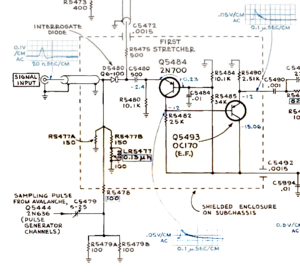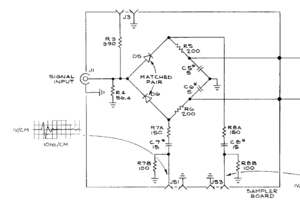Sampler
The signal chain in sampling oscilloscopes contains a sampler, which measures the input signal at a moment in time.
Some sampling scopes, e.g., the 11201, have the sampler as an built-in component. Other sampling scopes have the sampler as a built-in component of the vertical plug-in, e.g., the 3S76.
Another setup is to have the sampler in a sampling head, e.g., the S-4. Sampling heads sometimes plug directly into the oscilloscope mainframe, e.g., in the 11801. In other cases, the sampling head plugs into a vertical plug-in, e.g., the 7S11, which plugs into the oscilloscope mainframe. Sampling heads can also be used on extension cables, e.g., the 012-0125-00, which allows the path between the device under test and the sampling head to be as short as possible for minimum signal degradation.
Tektronix sampling oscilloscopes use at least four different circuits, using one, two, four, or six diodes, respectively:
| One-Diode Sampler | Two-Diode Sampler |
|---|---|
|
This is used in the Type N.  A single diode provides no symmetry and so the strobe pulse leakage (kick-out) is large. |
This is used in the 1S2, 4S2A, 1502, S-1, S-2, and the 7S14.  |
| Four-Diode Sampler | Six-Diode Sampler |
|
This is used in the 1S1, 3S1, 3S76, 4S1 and the early 4S2 (non-A).  |
This circuit, often called a travelling-wave sampler, is used in the S-4, S-6, SD-24 and SD-24.  The effective sampling duration is shorter than the width of the strobe pulse and for fast diodes only depends on the trailing edge of the strobe pulse and the delay of the transmission line between the diodes. For the S-4 and S-6 sampling gates the internal sampling diodes are reverse biased at a higher voltage, while the outer four diodes are reverse biased at about 0.6 V. The sampling signal is the charge trapped between the outer four diodes by the trailing edge of the strobe pulse.
|